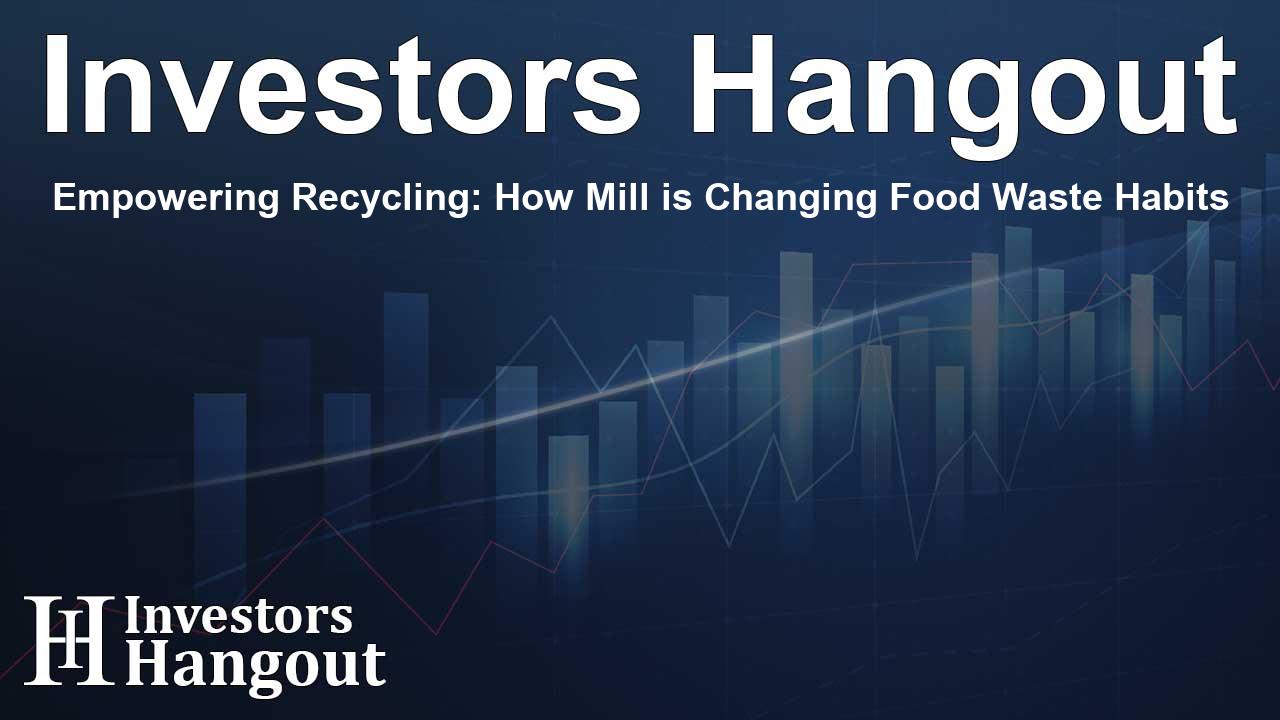Empowering Recycling: How Mill is Changing Food Waste Habits

Transforming Food Waste Management with Mill
Mill, an innovative food recycling company, is leading the charge in revolutionizing how households and businesses deal with food waste. Their recent data highlights a significant shift in consumer behavior, indicating that their methods are making a real difference in keeping food out of landfills.
Revolutionary Recycling Solutions
With the goal of eliminating food waste, Mill has developed a user-friendly solution that empowers individuals and organizations alike. By harnessing insightful data on food waste behavior, Mill facilitates smarter decision-making, making recycling food waste not just a choice, but a convenient habit.
Achieving Milestones
To date, Mill users have successfully recycled nearly 10 million pounds of food scraps, showcasing the effectiveness of their recycling systems. Their method stands out as users not only engage consistently but also reduce the amount of excess food they generate. On average, consumers using Mill add about one pound of food scraps daily, transforming previously wasted food into nutritious resources.
Before utilizing Mill, consumers reported recovering only around 26% of their food scraps. Since then, this rate has surged close to 90%. This impressive transition illustrates the impactful changes people can make simply by adopting effective recycling habits.
Changing Culinary Behaviors
The benefits extend beyond just recycling metrics. With nearly half of surveyed users reporting a decrease in food waste since adopting Mill, many are changing how they shop and prepare meals. Customers are adapting their cooking styles, shopping habits, and food storage methods to align better with their recycling practices.
Innovative Lifecycle Assessment
Mill's commitment to sustainability is further demonstrated through their comprehensive life-cycle assessment (LCA). Originally published in early 2023, this document has been updated to incorporate extensive real-world data from thousands of Mill devices now in use across the country. The updated LCA reveals significant insights into carbon emissions reduction tied to improved food management practices.
Reducing Carbon Footprint
The assessment indicates that the average household utilizing Mill’s system can avoid approximately 477 kg-CO2e annually through efficient management of food scraps. Furthermore, behavior changes leading to reduced food purchasing and usage can contribute an additional 258 kg-CO2e avoided each year. Together, these changes exemplify the profound environmental impact that can be achieved through thoughtful food waste management.
Community Partnerships and Local Impact
Mill's collaboration with community organizations, such as R.City in Phoenix, has shown remarkable positive outcomes. This partnership not only fosters local composting practices but also allows customers to partake in a sustainable food cycle by utilizing their own food scraps to grow fresh produce. The initiative emphasizes Mill’s commitment to building stronger, hyper-local food systems.
Enhancing Local Food Systems
The benefits of this partnership are substantial, including reduced operational costs, more efficient logistics, and higher customer engagement. The collaborative efforts have notably resulted in significant reductions in waste transportation, ensuring less waste on the roads and contributing to cleaner urban environments.
Mill's Philosophy
Mill is driven by the belief that food should not be treated as waste. Their innovative kitchen experience encourages users to view food as a valuable resource. Founded by industry pioneers who previously worked on smart home products, Mill’s founders understand the importance of making responsible habits easier for consumers. This commitment is apparent in every aspect of their product design.
Frequently Asked Questions
What is the main mission of Mill?
Mill aims to eliminate food waste by offering innovative recycling solutions that transform how households and businesses manage food scraps.
How much food waste has Mill recycled?
Users of Mill have successfully recycled nearly 10 million pounds of food scraps, demonstrating their significant impact on reducing food waste.
What changes have users reported since using Mill?
Many users report they waste less food and have altered their shopping and cooking habits, with recovery rates of food scraps increasing from 26% to nearly 90%.
How does Mill's life-cycle assessment impact sustainability?
Mill's life-cycle assessment provides data showing substantial carbon emissions reductions achieved through improved food management practices, helping to reinforce their commitment to sustainability.
What community partnerships does Mill have?
Mill has partnered with organizations like R.City to promote local composting, enhancing community agriculture and sustainability by turning food scraps into fresh produce.
About The Author
Contact Addison Perry privately here. Or send an email with ATTN: Addison Perry as the subject to contact@investorshangout.com.
About Investors Hangout
Investors Hangout is a leading online stock forum for financial discussion and learning, offering a wide range of free tools and resources. It draws in traders of all levels, who exchange market knowledge, investigate trading tactics, and keep an eye on industry developments in real time. Featuring financial articles, stock message boards, quotes, charts, company profiles, and live news updates. Through cooperative learning and a wealth of informational resources, it helps users from novices creating their first portfolios to experts honing their techniques. Join Investors Hangout today: https://investorshangout.com/
The content of this article is based on factual, publicly available information and does not represent legal, financial, or investment advice. Investors Hangout does not offer financial advice, and the author is not a licensed financial advisor. Consult a qualified advisor before making any financial or investment decisions based on this article. This article should not be considered advice to purchase, sell, or hold any securities or other investments. If any of the material provided here is inaccurate, please contact us for corrections.
